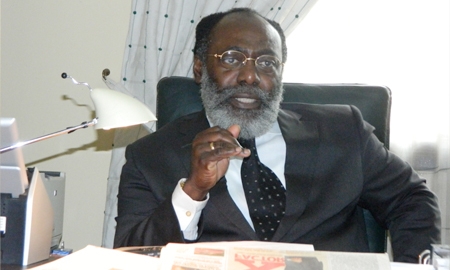Even before investing was seen as safe in the African nation of Equatorial Guinea as a result of its oil boom,
CCEI Bank GE (opened in 1994) believed in the potential of the country.
Now, just under two decades later, as Equatorial Guinea sees record growth in its economy,
CCEI is the number one bank in the nation with 77% of all the credit in the national market and 46% of all customer deposits. It has offices in both the nation’s capital of Malabo and the largest city, Bata.
“The most important thing was to believe in the country, because obviously if you don’t believe in the country, it’s not worth it to invest there,” says Alberto Doria Lajay, General Manager of
CCEI. He notes that although there were other banks in the region when his establishment first arrived, the vision of the founders allowed
CCEI to develop all the way to 75% of the market.
The parent company, First Afriland Bank, was originally founded in 1987 in Cameroon and since has expanded, not only to Equatorial Guinea, but also to Liberia, China, the Congo and France, among others.
“It is really satisfying when
I go outside
and see all the great work that the bank is financing. The majority of
the projects in
the country are being done through CCEI financing.” “We do everything possible so that the client is satisfied and I think our success is based on this.” Alberto Doria Lajay
General Manager of CCEI
Bank GE |
Recent years have shown significant growth for
CCEI with the volume of activity increasing by 13% last year while profit grew by 7%. 2010 also proved to be a record year for
CCEI in terms of activity and outcome.
Much of
CCEI’s business is to provide credit for small and medium-sized enterprises (SMEs), financing 76% of the market, putting significant emphasis on the development of agricultural companies. The success
CCEI has experienced within Equatorial Guinea is related to its relationship with its clients.
“The interest of the customer is our priority,” says Mr. Doria, repeating the bank’s slogan. “We do everything possible so that the client is satisfied and I think our success is based on this.”
The company not only provides financing for SMEs but also financial advising for potential enterprises, evaluating their profitability. Mr. Doria explains that although many businessmen are not usually savvy about the administrative aspect of setting up the financing for their business, the bank can assist them to get their project off the ground.
“It is really satisfying when I go outside and see all the great work that the bank is financing,” says Mr. Doria. “The majority of the projects in the country are being done through
CCEI financing.”
Besides being the main credit provider for the country,
CCEI also offers modern banking services. Within Equatorial Guinea, a network of ATMs is being set up along with the implementation of credit cards.
CCEI will also shortly begin to offer online banking and hopes to extend the cash dispensers further.
These modern resources will further facilitate international banking and investments. In 1985, Equatorial Guinea became part of the Economic Community of Central African States (ECCAS), an important measure for their national currency and foreign investors.
“We used to have a currency that could not be converted which was a huge headache for us. When we joined the ECCAS, our currency became the CFA franc, which is convertible,” explains Mr. Doria. The CFA franc originally could be exchanged for a French franc and currently trades freely with the euro.
This convertible currency facilitates international investment opportunities in Equatorial Guinea. The biggest international investor in the country is the United States with 2,000 Americans entering the country every year.
Moreover, Mr. Doria notes the beneficial laws for investors within the country which allows for easy and full extraction of capital and profits. He also highlights
CCEI services for international investors for fast money exchange between countries allowing for easier investing.
Although international transactions are important for Equatorial Guinea’s economy,
CCEI also puts an emphasis on giving back to the local community. Committed to corporate social responsibility (CSR),
CCEI has built schools as well as helped improve the medicine in the country. Along with participating in a campaign against AIDS and donating medicine to sick children,
CCEI also constructed and equipped the infectious disease block at the Regional Hospital of Malabo.

1 COMMENT
Me parece un mercado fascinante,